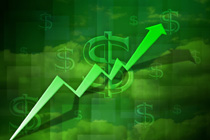 by David Solway –
by David Solway –
It’s really very simple. One does not need to take a graduate course in Economics to figure out why a productive society prospers and how it can be destroyed. As Tim Harford explains in The Undercover Economist, “Economics is partly about modeling, about articulating basic principles and patterns that operate behind seemingly complex subjects.” The key word is “seemingly.” The other part of Economics is plain common sense—the part which all too many economists refuse to practice since it deprives them of shamanistic status as delvers into realms of mystical complexity. Paul Krugman comes immediately to mind. “[I]ncreased government spending,” pontificates The New York Times guru, “is just what the doctor ordered, and concerns about the budget deficit should be put on hold.” One may be pardoned for thinking that it is Krugman who should be put on hold.
There are, it’s only fair to note, a handful of practitioners who command respect for the combination of wit, learning, insight, humility and levelheadedness they bring to the discipline. Milton Friedman provides an excellent example of this rare breed of thinker, a man who could turn pertinent aphorisms on a lathe and who was no stranger to prudence and good sense—what Aristotle in the Nicomachean Ethics called phronesis. But the Friedmans among the economist caste, the exemplars of phronesis, are a small minority. As for the current political class in the U.S., Sarah Palin and Paul Ryan are conspicuous for economic reasonableness and practical acumen that coincides with what everybody knows—or would know—if they thought about it.
For the basic issues are by no means complex. We recall that the word “economy” comes from the Greek oekonomia, namely, household affairs, domestic management, as Aristotle lays it out in the Politics. High finance and market speculation, for all their daunting ramifications, are only an esoteric derivative of straightforward economics. Of course, managing a nation involves many more factors and “parameters” than attending to the family budget. But the underlying structure is the same. As every responsible householder is aware, there are, in effect, four basic principles that must be taken into account to ensure economic viability.
1. You must earn and produce.
2. You must try to spend less than you earn.
3. The remainder should be saved or carefully invested in case of emergency and for the future.
4. And if you borrow beyond your present means, for reasons that are deemed necessary (e.g., mortgages, auto purchases, domestic appliances, education, etc.), there must be an empirical presumption of feasible repayment that does not lead to destitution.
Complications will naturally arise in a world prone to sudden disruptions—nothing in life is absolutely secure. And admittedly, on the scale of macroeconomics, which deals with interest rates, inflation, unemployment, trade imbalances, bond markets, monetary policy, resource procurement and so on, contingencies will be introduced that demand a higher degree of economic savvy than that required by the everyday householder. Moreover, fiscal dispensations are often tied up with political objectives and calculations, which tend to generate intricacies and convolutions not easy to disentangle. There are electoral constituencies that need to be satisfied if a political party is to cling to power, an exigency that muddles economic rationality—although this is also true, mutatis mutandis, with respect to clamoring family members in the interests of domestic peace. Nevertheless, these four principles represent the bedrock of economic management at any level of organization, whether that of the individual family or of the nation considered as an organic whole.
Economics is often defined as “the science of scarcity” and the study of how to make the best of diminishing returns. Regrettably, the current economic climate in the U.S. is characterized by the scarcity of intelligence and the study of how to make, not the best, but the worst of returns that continue to diminish. As Steve Forbes says, “People know that something is wrong with the dollar…You cannot trash your money without repercussions.” Clearly, the four principles of solvency have been systematically violated. Production is down. We spend more than we earn—as well as spend what we haven’t earned. Surpluses are non-existent. And borrowing is out of control, with no pragmatic arrangement or prospect of repayment. The result is a weakened currency and a nation in disarray.
Friedman presciently warned in Money Mischief that “The fate of a country is inseparable from the fate of its currency.” This dictum and its elaboration in his work serve as a necessary corrective to the influential monetary theories of John Maynard Keynes who, in the succinct summation of Time magazine, advocated “the radical idea that governments should spend more money than they have.” The point was to trigger what Keynes, in The Means to Prosperity, called a “multiplier effect” in the creation of jobs and the stimulation of consumer spending. But as Friedman argued in a seminal paper, “The Role of Monetary Policy,” the Keynesian agenda didn’t work, leading instead to stagflation, that is, high unemployment and inflation operating in tandem.
To put it in moderately technical terms—as a sop to “professionals”—Keynesian policy embraced the famous Phillips curve model that posits an inverse relation between unemployment and inflation, on the strange assumption that a high rate of inflation causes lower unemployment and in consequence greater consumer spending. Friedman (and others) showed that the Phillips curve was inoperative over the long term. The corollary of this refutation was that government, with its control of the Federal Reserve and central banking functions, should not interfere in the running of the economy, particularly in setting employment targets and engaging in deficit spending to boost the economy, since its efforts are more than likely to be futile. Metaphorically speaking, the economy resembles a beast that must be allowed to roam freely in its natural habitat and that will not be tamed by non-nutritious fodder. The purpose of government is merely to ensure the habitat remains stable.
Part of the malaise from which we suffer today is that our fiscal authorities, like Ben Bernanke and Timothy Geithner, follow the prescriptions of Keynes and his disciple Krugman and not of Aristotle and Friedman. Facing a mounting wall of debt and entitlement disbursements, the solution they adopt is to increase the money supply without limit, aka “quantitative easing,” that is, maxing out the credit card. And when the credit card is no longer accepted, they merely acquire another with which to pay off the original, which is called “raising the debt ceiling.”
When a householder acts in this way, he must eventually declare personal bankruptcy and go on the dole. When a nation acts in this way, it must inevitably default on its fiscal obligations and/or devalue the currency—but there is no dole to fall back upon. The consequence is economic, political and social devastation. In the words of Walter E. Williams, author, syndicated columnist and an economist at George Mason University, “If debt continues to grow the way it has been growing for the last decade…we’re just going to collapse.” Williams predicts that America is about “to go the way of other great nations historically…And that is down the tubes.”
True, there are all too many householders who have succumbed to the consumption-and-spending mania rife in the U.S., having forgotten the maxims of resourceful management, or phronesis. But hardworking families, the very backbone of the nation, are generally aware of the constraints they must deal with. The problem rests mainly with government profligacy. If the plunge toward economic ruin is not checked, privation and forfeiture will be the dismal fate of the country. Slight upturns are illusory. The dead cat may bounce, but that doesn’t make it any less dead.
The situation has become increasingly dire under the programmatic mismanagement of the president of the country and his delegates. Indeed, if Obama handled his household the way in which he governs his nation, he would shortly be on the street jingling a tin cup. But, of course, he is a multi-millionaire who knows very well how to manage his personal finances. He is brilliantly adept at microeconomics. However, when it comes to the macro plane of economic oversight, he is either a complete incompetent or a very clever student of the neo-Marxist Cloward/Piven doctrine of orchestrated crisis that envisages social upheaval via uncontrolled expenditure.
The slightest acquaintance with Economics 101 makes it abundantly clear that, on the national level, the four fundamental pillars of economic health are routinely disregarded or deliberately contravened. Whether through ignorance or intent on the part of our leaders and their appointed experts, these four load-bearing beams are now beginning to crack and the house is perilously close to toppling on its foundations.
HT: FrontPageMag.com (read full article)


